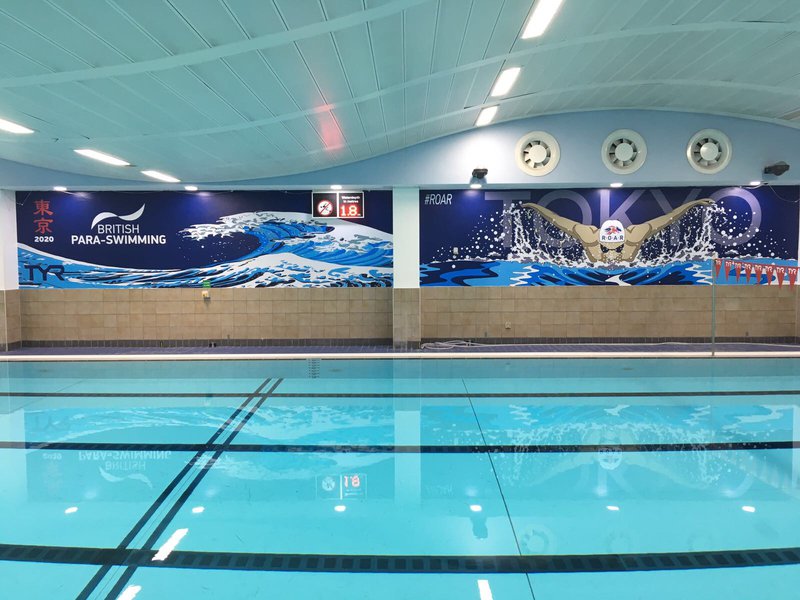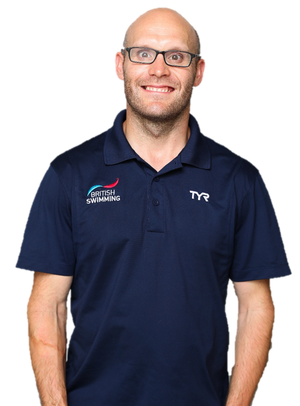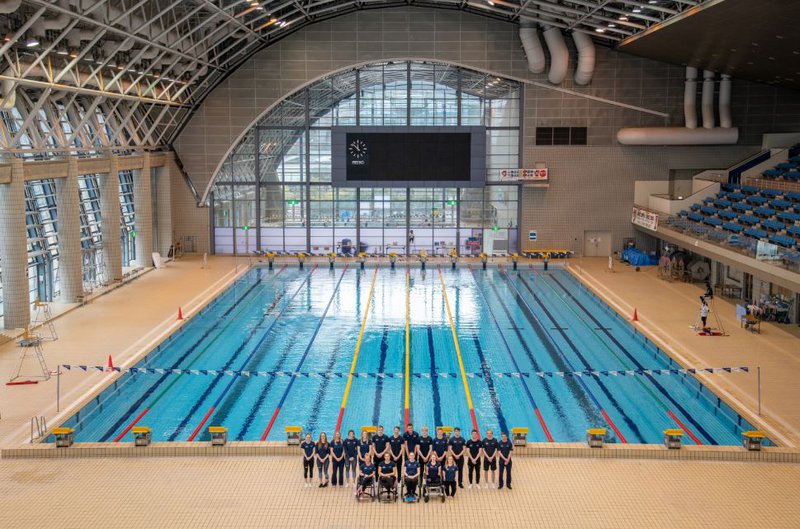This Cerebral Palsy Awareness Month, and to celebrate the 20th anniversary of CP Sport, British Para-Swimming Physiotherapy and Athlete Lead Ritchie Barber shares his cerebral palsy (CP) journey and the role that sport, education and employment have played in it for our latest Hot Topic.
I believe our disabilities should not define who we are; more importantly, we should be defined by what we do with them. I wrote this article with that in mind – a piece for anyone connected with CP.
Reflection – looking back so that the view looking forward is clearer
I’ve been fortunate enough to have had the opportunity to achieve some important goals in my life. I competed at the 2000 Sydney Paralympic Games for British Para-Swimming, where I won a silver medal in the S7 50m Butterfly; I graduated with first-class honours from Salford University and realised my dream of becoming a physiotherapist; I have a fantastic, supportive family and two great kids.
Finally, I kept a promise to myself I made the day I retired from swimming, returning to the British Para-Swimming Team as their physiotherapist. But what key moments have defined my journey – and what role has my disability played?
Serendipity – finding something good without looking for it
It would be remiss of me not to acknowledge the role luck has played. Diagnosing CP can be challenging, as it takes time and no one test confirms or rules out CP.
Had a picture of me at a very young age not been sent to a relative of mine in Canada, my diagnosis could have been delayed or even missed so, with fate intervening, my diagnosis was made early and resulted in prompt intervention. This gave people around me valuable education, support and confidence and I was taught to explore and challenge my own movement, which led to a lack of fear and a greater level of function and independence.
![Ritchie Barber Sydney 2000 [AllsportGettyImages].jpg](https://www.aquaticsgb.com/media/images/Ritchie_Barber_Sydney_2000_AllsportGettyImages.width-300.jpg)
Unfortunately, many other children may have missed out on this. It’s important that if you have any concerns about your child’s development, you seek the appropriate help. Early diagnosis can help and, certainly from my experience, can improve overall quality of life.
Opportunity – It does not just happen, you have to create it
Swimming became crucial for my therapy and, importantly, in developing my social skills and building self-esteem. Swinton ASC was where it all started for me - coached by Carol Coles, I mastered the basic skills. It’s sad that our closest rivals back then, Worsley ASC, have not survived this pandemic and have closed their doors for good, which is a fate that many clubs around the country face right now. This could result in a devastating lack of opportunities for young CP swimmers starting their journey in sport. This pandemic has really highlighted to me the important role these clubs played in providing me with the possibility to develop and thrive in swimming.
As my swimming advanced, I was accepted for a trial at City of Salford Swimming Club. Their early enthusiasm for inclusivity really opened the door and gave me the opportunity to excel. I feel incredibly lucky to have been given the chance to train in a way that was not available to many other swimmers with disabilities at that time.
Inclusivity is so much more at the forefront of people’s minds now. However, we must never forget the unique needs of athletes with CP and hence the drive for full inclusivity may not be right for all CP athletes. If I had not seized this opportunity, my future could have looked a lot different – even the social circle I have now includes friendships I built back then and influential coaches are still part of my life now. These relationships gave me the confidence to progress and I would like to thank all of my coaches for their valuable time, knowledge and experience over the years.
I was once told that a good swimmer has to appreciate the value of ‘slow swimming’ to be able to swim with 20 gears instead of two. During a period of stagnation in my training performance, with signs of over-reaching, this concept put me back on track. I can’t thank my coach from that time, Colin Hood, enough for his ability to show me the value of an individualised training programme, when I needed it the most. This lesson was arguably the most important lesson I learned as a swimmer and one that proved fundamental on my path to success at the Sydney Paralympic Games.
CP Sport and Jill Stidever played a crucial role in my early international swimming career. Under their guidance, I was able to develop the necessary skills to survive away from home and begin to experience what it was like to compete in international swimming competitions. It’s so important that aspiring athletes with CP have these protected pathways to enable them to develop into athletes who can represent British Para-Swimming.

Elite sport is not for life, education is
When I was a toddler, it was suggested that mainstream schooling may not be the best option for me. However, after some initial struggles I found my feet, my desire to prove myself to others, and the will to progress through the education system the way I wanted to.
At 16, I knew I wanted to be a physiotherapist. I viewed education as a way to level the playing field and studied with a competitive edge, not settling for second best.
With the introduction of UK Sport lottery funding, I was able to find a healthy balance between education and sport, enabling me to appreciate living in the moment as an international swimmer, whilst protecting time to secure my future through finishing my education. I was able to absorb the experiences elite sport gave me – which is not always easy to do if we allow ourselves to be consumed by our anxieties around balancing study and sport. I was able to focus, leading to consistency in my study, which ultimately led to performing well above what people around me expected.
When I work with athletes now, I like to get to know what they are up to in their education, and whether I can help in any way. The EIS Performance Lifestyle team provided me with support and this was crucial. It’s important that any educational support is seen as an active process; you have to invest time and effort in to the process - if you don’t, you shouldn’t expect to reap the rewards.
Trusting my gut
Spending time with the EIS physiotherapists based in Manchester and those providing physiotherapy on GB camps gave me experience I could draw on when my university interview came around.
One of the most important questions I’ve been asked is, “if you had to choose between your swimming career and the completion of your physiotherapy degree, which one would you choose?” That was the question I faced at my interview prior to receiving an offer to study physiotherapy at the University of Salford in 2003 – and that’s when I realised that the balance was tipping towards studying.

The course itself was very practical, with periods of working in hospitals on work placements led by workplace educators, interspersed with heavy blocks of study, and culminating in various practical viva (face-to-face) examinations. As I entered my second year at university, balancing sport and education was proving too challenging; that’s not to say it’s not possible, it just doesn’t suit everybody, and if this is you, you shouldn’t be afraid to say so! I knew it was time to stop swimming because when I was swimming I was thinking about studying, and when I was studying I was thinking about swimming – and both suffered.
Progress, not perfection
During my first work placement, concerns were raised about my CP and my fitness to practise. This was quite unsettling. What right did anyone have to postulate the outcome of my placement and my whole course within a few days of knowing me? This only served to feed my desire to prove doubters wrong, although it did affect my self-esteem to some extent.
Given the right circumstances and support, anybody can see abilities rather than disabilities - student or teacher, coach or swimmer. It’s safe to say I never failed a placement, although there were of course mistakes along the way. Smooth seas do not make skilled sailors.
After graduation, I secured a job at Warrington General Hospital, where my disability was never an issue. Under the guidance of some amazing practitioners, I developed my skills. Although I had many success stories, there were also some failures along the way – but this environment allowed me to fail safely and learn from it. It certainly was a case of progress, not perfection.
I often wonder how many practising physiotherapists have a registered physical disability, because this should be celebrated. These success stories could be used as blueprints to allow better levels of access to training in physiotherapy.
The importance of investing in yourself
I developed a keen interest in musculoskeletal physiotherapy (the assessment and treatment of muscles, tendons, ligament and bone). An opportunity caught my eye with a private healthcare provider; working in this environment showed me that there is no better investment than in your own healthcare. The patients I worked with had invested in the whole process, which I think was due to time - time with the patient to educate and inform. This ensured a high level of buy-in and team work. Little did I know at the time that this would prove invaluable in my next career move.

Out of the frying and pan into the fire
My time working with British Para-Swimming started in the spring of 2014. Moving into sport was a baptism of fire. Elite sport runs at an immense speed and it felt surreal to be in my perfect job - not many people get that opportunity.
I was later told my passion for para-swimming was tangible and infectious in my interview. This passion drives me forward week in and week out, giving me energy; investing in a project that excites me drives me forward and helps me achieve the goals I set out for myself.
Whatever employment you end up in, try to find your passion. The love for my job gets me through the tough times, and while I’ve had many a tough day at work, I’ve been lucky to work with some great physiotherapists along the way who have supported me. The clinical specialists based at Warrington General, Duncan Mason at Athlete Matters and Ian Horsley at the EIS, to name but a few, have all had a positive impact on my career as a physiotherapist.
The importance of gratitude
Experience and reflection have taught me some valuable lessons, like the importance of being grateful. I’m grateful for my disability. Yes, life at times has been challenging, but challenges bring opportunities to grow and develop and that leads to true achievement, achievement of your own making.
There will always be sources of support and guidance around you. I would not be where I am today had this not been the case. Acknowledging the good work that has led me to this point has given me an abundance of confidence for my future.
My journey is just an example of what can be achieved. Swimmers I have worked with have achieved far greater and the positive influence they have on society is exceptional; seeing para-swimmers succeed is the lifeblood of all I do in swimming. I’m immensely proud of all their achievements.
Life is full of key moments; use these to your advantage, no matter how big or small they are and endeavour to leave your footprint wherever you go. Remember to define your disability, don’t let it define you. So what role has my CP played in where I am today? It’s simple; it drives my desire to achieve more! And there is always more to be achieved.
Want to learn more about expert practitioners like Ritchie who help provide useful information, insight and advice for features like this? Head over to the 'Meet the Experts' section of the British Swimming Health Hub.

